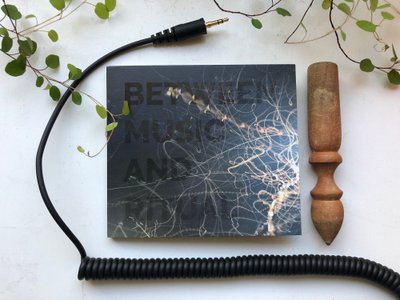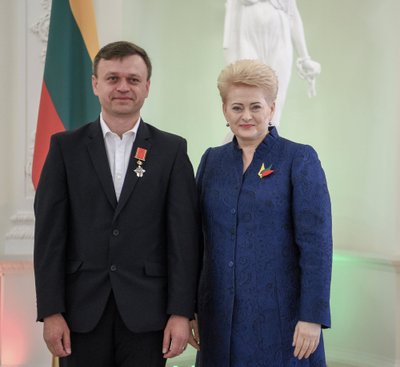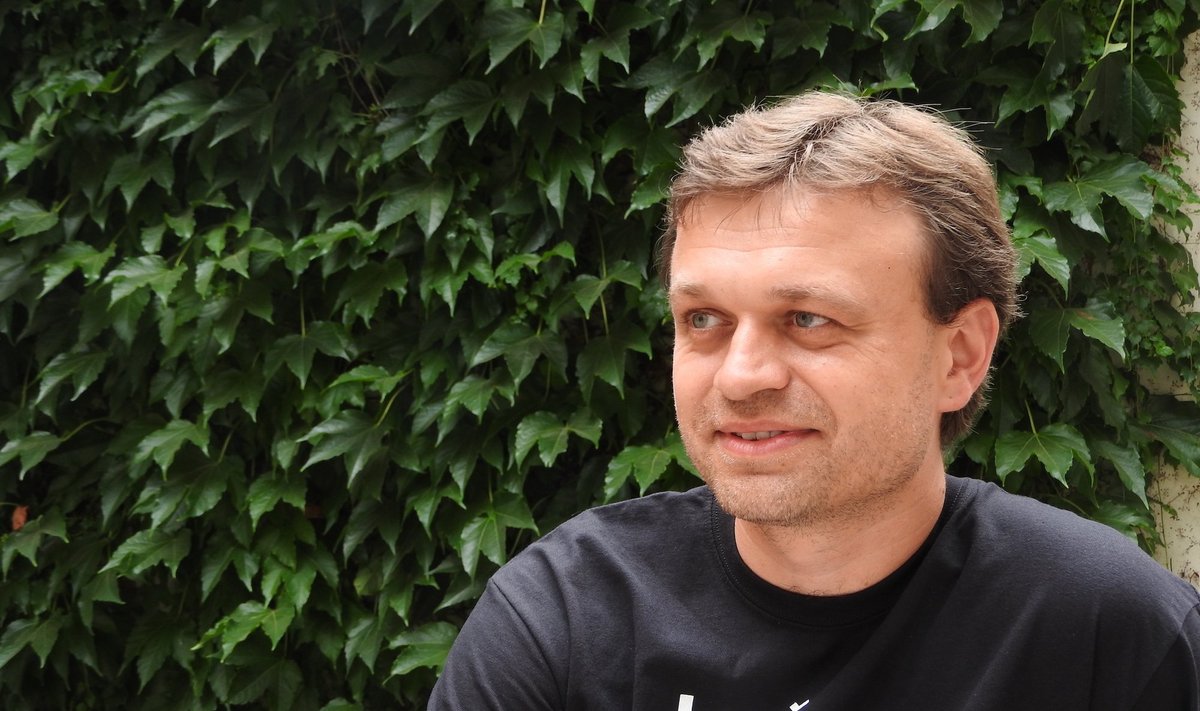In the curator’s own words, all works in this album demonstrate “the ritual quality of music” to a certain extent. “I endeavoured to make an album that would feature composers across the age spectrum and works across a variety of genres including instrumental and vocal, orchestral and chamber, acoustic and electronic, improvised and folk music combined with contemporary writing. In other words, my intention was to show Lithuanian contemporary music as a diverse, vibrant and stimulating scene, which it truly is,” he summarized in his foreword to the liner notes.
On this album the listeners will have an opportunity to relish the new recording of Bronius Kutavičius’ oratorio From the Yotvingian Stone by the Aidija Choir conducted by Romualdas Gražinis and the live recording of Justė Janulytė’s entrancing The Colour of Water made by Sinfonietta Rīga and saxophonist Arvydas Kazlauskas at a concert in Riga. Mikeš commissioned Antanas Jasenka to write a new piece especially for this album entitled Cinematic, while the Music Information Centre Lithuania organized two special recording sessions that resulted in the new version of Justina Repečkaitė’s work Designation & Expulsion performed by mezzo-soprano Justina Gringytė, bass Nerijus Masevičius and percussionist Andrius Rekašius and the recording of the piano part for Dominykas Digimas’ as it came into my little attic performed by pianist Marta Finkelštein in the empty hall of the Lithuanian National Philharmonic during the first lockdown in spring 2020.
Composers of the two last pieces on this album suggest listening to their music with headphones. In KNUS. Music for Headphones, composer-improviser Jūra Elena Šedytė (voice) collaborates with the maker of and improviser on DIY instruments, Simonas Nekrošius, in the process of ‘instant composing.’ In the album’s closing piece Whispered January, Arturas Bumšteinas collaborates with interdisciplinary artist Viktorija Damerell whose whispering of Robert Filliou’s text accompanies the sound collage, which was assembled using objects, materials and situations mentioned in the text.

On the occasion of this release, project manager of the Music Information Centre Lithuania Radvilė Buivydienė talked to the album’s curator, Vítězslav Mikeš.
- Why did you fall for Lithuania, not for any other country?
- By sheer accident. Some 23 years ago my friend and I decided to go to Saint Petersburg for the first time. We were hitchhiking and knew almost nothing about the Baltic countries. I remember the moment when we crossed the Lithuanian border: it felt like home. I recall how we slept under the sky in Alytus, somewhere in the park. I have no idea where this feeling came from because I felt nothing like this in Poland, only in Lithuania. It’s difficult to explain why. Some kind of mystery. By the way, we didn’t reach Saint Petersburg due to heavy rain and eventually had more time to get to know Lithuania (and a little bit of Latvia) and fall in love with the country.
Like most of the hitchhikers, we explored the surroundings and made as many contacts with the locals as we could. So we kept asking and met a lot of interesting people. One of them worked in the Lietuvos rytas daily and his wife was a pianist. He played the records of Čiurlionis to me and that was a very special moment when I first came into contact with Lithuanian music. We brought many good memories back home and the next year I couldn’t help myself from going back to Lithuania. This has become a tradition.
Then I realized that I have no wish to speak Russian or English to Lithuanians. So I enrolled at the university in Prague to study Lithuanian language. This gave me a possibility to spend three to four months in Lithuania each year and study at the Vilnius University. I could read books and understand relevant texts in Lithuanian. This was a great advantage in my work [Mikeš wrote a doctoral thesis on Bronius Kutavičius’ works based on texts by Sigitas Geda – Ed.].
- Your musical interests extend to the entire region of Central Europe and the peoples of the Caucasus. What is the music that you introduce to the Czech listeners in your programmes?
- I began from the generation of composers who emerged around the same time as Bronius Kutavičius. Other representatives of the same generation include Alfred Schnittke Russia, Tigran Mansurian in Armenia, Giya Kancheli in Georgia and so on. I feel close affinity to the music by these composers, that’s why I started promoting it in the Czech Republic by writing articles and hosting radio broadcasts. Later on I developed an appetite for discovering more composers from these countries, and for this very reason I wanted to learn more about Lithuanian music. When opportunity occurred to promote music not only via written texts, I tried to program music by composers from these countries whenever I had a chance. At first I was responsible for programming at the Hradec Králové Philharmonic; then followed a collaboration with the Berg Orchestra in Prague, which specializes in the performances of 20th-century music.
I’m convinced that music should be experienced live. It is essential that the organizers get to know certain kinds of music first-hand. You have to rack your brain for the solution what to offer them first. If we were to introduce Bronius Kutavičius, would we go for his symphony or some chamber piece? I knew that his oratorio Last Pagan Rites would make the strongest impression and made attempts to bring it to the Czech Republic. I can’t forget the reaction of the audience at the Music Forum in Hradec Králové – that was just amazing. After this performance, I could get on with the projects introducing other music by Kutavičius and other Lithuanian composers. I had a contact with Justė Janulytė and presumed that her music might have a deep impact on the local audiences. I was also on good terms with Anatolijus Šenderovas, Onutė Narbutaitė, Arturas Bumšteinas, as well as with jazz musicians including Liudas Mockūnas, Vladimir Tarasov (who became a godfather to my baby daughter) and others.
- In the album Between Music and Ritual that has been hatching for almost two years, your choice fell on seven works by Lithuanian composers from different generations. How would you imagine your ideal listener for this album? Or maybe you had no target audience in mind while developing the concept for this release?
- I started with myself and wanted to demonstrate music that I personally appreciate and introduce composers with whom I have built long-lasting bonds. I wish I had the chance to include many more works by other composers in this album, but it can’t be endless… I imagine such albums should reach out to those who are still using and listening to compact discs, who are eager to read about the composers and their works, and who have possibilities to include this music into concert programmes. So, I think this album is targeted both at average listeners and professional promoters.

It includes works that can be easily featured at concerts or festivals anywhere. For example, Mirga Gražinytė-Tyla has recently conducted the performance of Kutavičius’ oratorio, in which she was the only Lithuanian performer. Before that I thought this music can be performed only by Lithuanians but now I understand that it’s not necessarily so, if you have a conductor or a chorus master who can explain how to link up everything in this music to make it work. Janulytė’s composition on this album is no less captivating. I always had a soft spot for Jasenka’s work, especially for his Electronic Sutartinės, so I decided to commission him a new piece. In contrast, compositions by Jūra Elena Šedytė and Dominykas Digimas were a complete discovery to me.
- What recordings do you collect yourself? What kinds of music do you prefer to listen to in your free time?
- My private collection includes a highly varied assortment of records ranging from the classical to contemporary music from various countries and from jazz to rock. Even though I learned to play the flute and clarinet as a kid, my path into music was not completely straight. When I was a child my dream was to be a professional footballer. My interest in music dates to the gymnasium period when I, together with the same schoolmate with whom we travelled to Saint Petersburg, decided to form a rock band, in which he played the guitar and I played on keyboards. I just love rock music to this day, even though this is not something that you readily confess while working at the philharmonic (smiling).
- But why can’t you tell anyone?
- Because everybody thinks that all I’m listening to is classical music.
- What is Brno’s musical scene like in general? Which musical trends have the most active following there?
- Brno is the second largest city in the Czech Republic. Prague is a tourist attraction boasting three large orchestras whose programmes are all the same (perhaps with the notable exception of the Czech Radio Symphony Orchestra). They usually perform classical staples, such as Dvořák, Smetana, Brahms, Mozart, and Beethoven, and invite international ‘celebrities,’ while Brno is mostly associated with the life and work of Leoš Janáček. We at the Brno Philharmonic thus strive to be progressive and do things here that I can’t imagine happening in Prague. This disparity has deep roots in history and not only in the field of music. Of course, there are listeners who prefer to listen to the classical music alone but there are also others who have an interest in contemporary music. Our audience is rather varied and our programmes draw throngs of young people to the philharmonic concerts. They do not wish to limit themselves to Mozart and Beethoven and attend concerts because of other composers put on our roster.
Brno is full of modern architecture and students. They usually choose an accommodation in the city centre where there’s the greatest density of coffeehouses, clubs and a great diversity of music genres – from rock, jazz, disco to classical music. Only a few tourists can be met in the city centre, while life is booming here and many concerts are taking place in open air. There is a huge difference from Prague where the locals try to avoid the city centre. Trends like alternative rock and modern folklore have a strong footing in Brno, which over the years have spawned many prominent acts and figures, such as Iva Bittova. Brno has a really strong scene for this type of music.
- Translations are another area of your interest. Can you tell us what are you translating at the moment?
- Translating a book from Lithuanian into Czech language was my dream. Last time I was in Vilnius, I stumbled upon a novel by Undinė Radzevičiūtė titled Žuvys ir drakonai (Fish and Dragons) in the bookshop. I started reading while standing in the bookshop and found the novel most absorbing. Although her writing seems rather simple, with terse sentences, there’s a lot to grapple with for a translator. It took me a year to translate this book, which is out soon. We’ll see: if it’s received well by the readership, then I will gladly translate another book.
- Do you have any plans related to Lithuanian artists in the nearest future?
- All the time! I have plans to include them in our programmes all the time.
- What would you suggest to Lithuanian artists aspiring to wend their way into the festival programmes in the Czech Republic? Or maybe proposals from the outside are unwanted and disregarded in these uncertain times during the pandemic?
- I guess they should not wait because now is the best time to start something. Everything depends on the people with whom you communicate and to whom you can propose something. It depends on the idea, on the project. I always start with my own thoughts, then I discuss them many times with my colleagues, musicologists and musicians, who can propose something else and sometimes change the whole thing.
Unfortunately, the Czech Music Information Centre is not very active but it organizes a festival of contemporary music in Prague called Contempuls. They should provide all necessary information and contacts but their activity is limited to the field of contemporary music. I can be always spoken to for advice and will gladly offer assistance to those seeking information where to go and find the right people.
